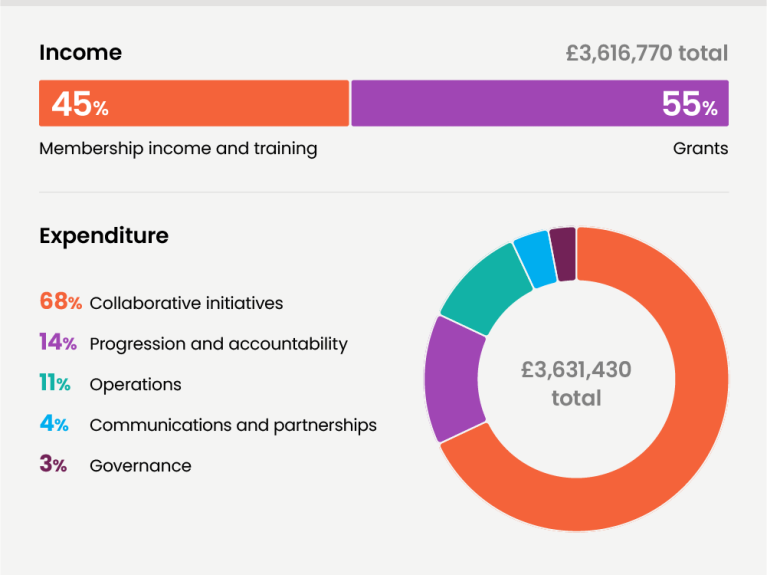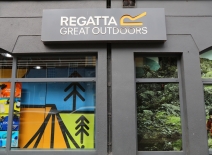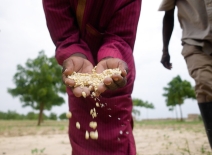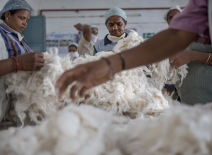The Ethical Trading Initiative is a leading alliance of trade unions, NGOs, and companies, working to advance human rights in global supply chains.
We provide a trusted, practical space for collaboration to improve working conditions, address human rights abuses and support resilient, responsible business practices.
From April 2024 to March 2025, we delivered impact through three essential areas of work as set out in our Theory of Change:
This work was conducted in line with our mission and vision and guided by the aims and goals we set out in ETI’s Strategy 2026.
Highlights
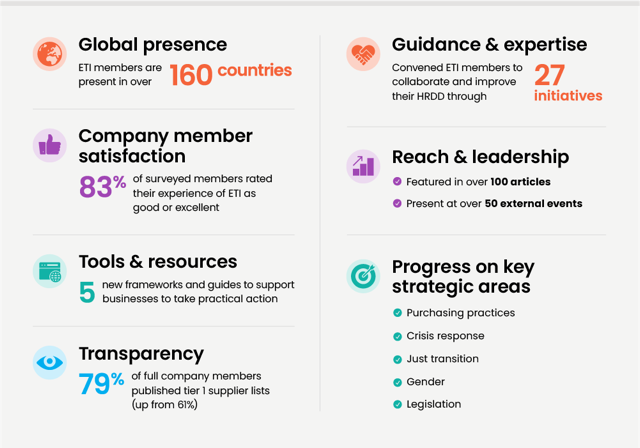
New members welcomed

Facilitating an enabling environment
Effective rights protections depend on effective governance. Workers’ rights are shaped not only by workplace practices, but also by the broader ecosystem of laws, policies, and enforcement mechanisms. ETI helps shape practical, effective legislation by engaging with regulators and advocating for laws that work for both workers and business. As a trusted, independent voice, we amplify the perspectives of companies, trade unions and NGOs to ensure regulation is both credible and workable.
Momentum around business and human rights legislation continued to grow through 2023-24. However, 2024-25 brought troubling setbacks, including a proposed repeal of Germany’s Supply Chain Due Diligence Act (LkSG) and attempts to weaken the CSDDD through the Omnibus Simplification Package.
ETI responded by working independently and with over 200 stakeholders from business, finance, civil society, and trade unions to defend these laws. We also supported efforts to introduce mandatory human rights and environmental due diligence (mHREDD) in the UK — leading workshops with the Department for Business and Trade, engaging with the UK National Contact Point to strengthen complaints mechanisms, contributing to updates of Modern Slavery Act guidance, and informing the Joint Committee on Human Rights’ report on forced labour.
As global frameworks evolve, our commitment remains constant: advocating for strong, enforceable standards that protect people and planet, while supporting businesses to meet them.
Supporting companies to understand emerging legislation
Learn how ETI supports companies on mandatory human rights due diligence, explore emerging laws using our tracker, and understand key pieces of legislation using our factsheets.
Driving progression & accountability
Member progression
ETI guides and equips members with structured guidance, peer learning and practical tools to embed meaningful human rights due diligence (HRDD) across their operations and supply chains.
Our HRDD Progression Framework provides a structured pathway to help members to identify gaps and work towards measurable targets. Members participate in interactive HRDD workshops on key topics within the framework — such as risk assessment, strategy development, and remediation — drawing on the diverse knowledge and experience of our ETI experts and company, NGO and trade union members to help them progress. Our approach is grounded in the UN Guiding Principles on Business and Human Rights, and aligns with emerging legislation, guiding companies to go beyond compliance.
Company members commit to continuously improve and implement a HRDD approach through the ETI Member Charter and report on their efforts in the public domain, in line with ETI’s Corporate Transparency Framework.
Members consistently tell us how much they value ETI’s HRDD workshops, citing:
- Opportunities for collaboration and peer-to-peer learning
- Practical tools and guidance to apply in real-world contexts
- Clear and achievable steps to support the implementation of effective HRDD
- Structured approach to gap analysis, identification of meaningful improvement actions and measurable targets
- Access to NGO and trade union expertise and insights
But don't just take our word for it...
Member transparency
Transparency is essential for ensuring accountability and demonstrating compliance with emerging legislation. Through ETI’s Corporate Transparency Framework (CTF), we require company members to publicly disclose their human rights due diligence practices through seven core minimum requirements. We offer a non-judgemental, transparent way of working, supporting company members to move forward confidently and responsibly.
Last year, ETI became the first multi-stakeholder initiative to mandate tier one reporting on Open Supply Hub, this year we made company member performance against the CTF public.
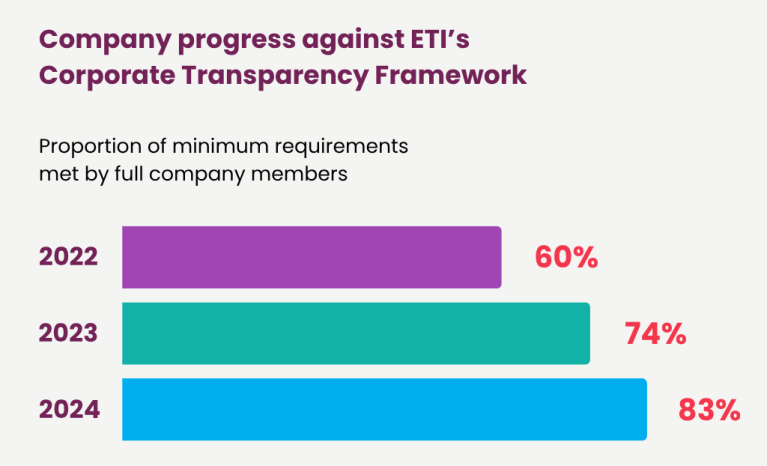
.
Collaborating for impact
ETI brings companies, trade unions, and NGOs together to take coordinated action on systemic risks — where no single actor can make lasting change alone. Our members work with like-minded organisations to increase leverage and create systemic long-term change. Through collective action, our members work to address a range of critical issues in alignment with our four thematic priorities: purchasing practices, gender, just transitions, crises and challenging contexts. These efforts aim to drive meaningful impact across three key sectors: apparel and textiles, food, farming and fisheries, and general merchandise.
Responsible purchasing practices (RPP)
ETI is committed to improving purchasing practices across sectors. While fashion and food have seen a growing focus on responsible purchasing — with the publication of the Common Framework for Responsible Purchasing Practices in apparel (2022) and food (2024) — industries such as electric vehicles, construction, cosmetics and stone have largely been overlooked. In FY24-25, we co-developed the Common Framework for Responsible Purchasing Practices in Manufacturing, to help companies in manufacturing industries engage collaboratively with supply chain stakeholders and take meaningful, practical and collective action to improve their purchasing.
Over 21-months, ETI assessed 15 companies from diverse manufacturing sectors on their purchasing practices and evaluated the effectiveness of improvement measures implemented. The project engaged diverse stakeholder groups through surveys, consultations, and direct advocacy with companies. This multi-stakeholder process helped to deepen shared understanding of how buyers and suppliers engage in purchasing practices and their human rights impacts.
“ETI’s mapping of the CFRPP MI against the CSDDD highlights the alignment between responsible purchasing and emerging EU legislation, supporting companies in integrating due diligence and advancing sustainable change through strong partnerships.”
Maria del Carmen Mora Garduno
Advisor at Initiative for Global Solidarity, Deutsche Gesellschaft für Internationale Zusammenarbeit (GIZ)
Industry perspectives
ETI explored purchasing practices from the perspectives of manufacturers, industry associations, brand representatives and trade unions in three major sourcing countries — India, Bangladesh, and Türkiye. Through workshops and interviews with 123 stakeholders, we gathered first-hand insights into how company purchasing practices affect suppliers, workers, and the wider sector. These interactions shed light on the pressing challenges of current purchasing practices, revealing critical issues that directly affect workers’ lives and the sustainability of the textile industry.
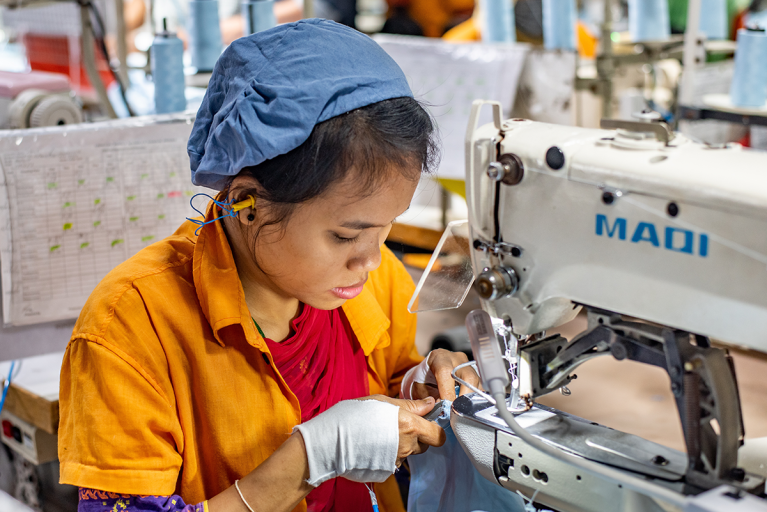
Gender-responsive HRDD
Gender-responsive human rights due diligence recognises that human rights violations are not gender-neutral. At ETI, we support our company members to intentionally consider how risks differ based on gender and to ensure their HRDD processes are inclusive, equitable, and effective by embedding gender analysis throughout.
In FY24-25, ETI collaborated with the Partnership for Sustainable Textiles to develop guidance to support supplier in collecting gender-disaggregated data. Suppliers have a vital role to play in creating workplaces that are fair, safe, and respectful of everyone’s rights. Through the use of data, suppliers can uncover the root causes of gender-based discrimination in their factories and move beyond treating symptoms.
ETI also supported company members within the general merchandise group to explore the gender dimensions of occupational safety and health (OSH) risks for workers. Women, men and gender diverse individuals often face different OSH risks due to a variety of factors, including biological differences, job segregation, and gender roles. Ensuring that all workers can benefit from effective OSH measures in their workplaces is a fundamental pathway to the achievement of gender equality.
ETI members identify gender-based violence and harassment (GBVH) as a salient human rights risk that cuts across sectors, demanding urgent and collective action. Addressing it effectively requires a gender-responsive HRDD approach that tackles root causes and is grounded in meaningful stakeholder engagement.
Through the Gender Responsive Action Community at ETI (GRACE), ETI has created a trusted space for companies to build capability, strengthen their policies and practices, and align in how they engage with suppliers and worker representatives on GBVH. Together, members are co-developing practical tools — due to be tested with business, trade unions and NGOs at the end of 2025 — to support credible, consistent action.
To drive system change, ETI has also convened multi-stakeholder workshops and focus groups with retailers, suppliers, workers, unions, civil society and relevant experts. This collaboration is shaping a shared understanding of the factors that increase the risk of GBVH in supply chains and how they can be addressed. This work will culminate in a set of co-created principles, launching in late 2025, to ensure alignment, shared responsibility, accountability and collective impact.

Just transitions
At ETI, our just transitions work aims to advance human rights in supply chains in the era of climate crisis. We work with companies to understand and mitigate workers’ rights impacts caused or exacerbated by the climate crisis or by a company’s own climate action, putting social dialogue with workers at the centre of their approach. In FY24-25, this included supporting companies to address risks and impacts of extreme heat and flooding, and to engage workers in transition planning, through green social dialogue. Alongside these efforts ETI embarked upon two new projects, one in the leather sector and another in agriculture:
Grievance mechanisms in agriculture
Migrant agricultural workers in Southern Europe play an essential role in supplying fresh produce to businesses and consumers across Europe. Yet many face heightened risks of exploitation, limited access to rights, and few safe avenues to raise concerns. Funded by the UK Government, ETI’s ‘Grievance mechanisms in agriculture’ programme aimed to strengthen human rights due diligence and improve migrant workers’ access to remedy in high-risk agricultural supply chains in Spain and Italy. Through a multi-stakeholder working group of 18 retailers, suppliers, NGOs and trade unions, ETI carried out research to understand the availability, type, and usage of existing formal and informal grievance mechanisms among migrant workers in the two countries, including how usage is linked to existing types of contracts and recruitment channels at grower sites.
Based on this research, the project launched two pilots for worker-driven grievance mechanisms in Spain and worked to build a modern slavery prevention network in West and North Africa — sharing information on rights, ethical recruitment and emerging risks before migration. By convening business, trade unions and NGOs, ETI worked to deliver credible, collective solutions that aim to reduce systemic risks, build supply chain resilience and protect the most marginalised workers.
Crises and challenging contexts
Supply chain workers face heightened human rights risks when a crisis hits and in challenging contexts where systematic and state-imposed human rights violations take place. From conflict and climate change events to tumultuous trade tariffs, crises can come in various shapes and sizes. In such circumstances, implementing human rights due diligence, protecting workers and sustaining supply chains can prove more difficult and sometimes impossible. At ETI, we support our members to strengthen their supply chains through heightened human rights due diligence and to respond effectively when crises occur.
In the last year, we monitored and responded to crises and challenging contexts impacting members’ supply chains around the world – from political upheaval in Bangladesh to earthquakes in Myanmar – supporting them with timely guidance on heightened human rights due diligence and responsible business conduct.
ETI’s global presence
ETI and our members have a presence in over 160 countries worldwide, affording us expertise and access to global networks and supply chain insights. We have sister organisations in Denmark, Sweden and Norway, and country offices in Bangladesh and India.
Bangladesh
In 2024, ETI Bangladesh reached over 167,000 workers across 72 factories, delivering expert training to advance decent work, gender equality, and climate resilience. Through programmes in social dialogue, gender-sensitive workplaces, and climate action, ETI Bangladesh works to amplify the voice of workers, improve industrial relations, and promote just transitions.
Key achievements included training over 8,000 workers on climate change awareness and engaging 161,000 workers in awareness raising campaigns on gender-based violence. ETI Bangladesh also engaged with the Labour Law Reform Commission to advocate for stronger protections and launched a new programme in the leather sector to address social and environmental impacts in manufacturing. ETI Bangladesh’s efforts aim to foster safer, more equitable workplaces as a leading advocate for human rights due diligence and sustainability in Bangladesh’s supply chains.
Learn more about ETI Bangladesh
India
ETI works to advance responsible business conduct in India through collaborative, rights-based programmes across the country’s apparel and textile sector. Through strategic engagement with factories, workers, brands, and civil society throughout FY24-25, our work helped build awareness, capability, and alignment around global due diligence frameworks. During this period, we facilitated training to support suppliers in understanding the CSDDD and promoted responsible purchasing practices among brands. A major milestone was the revival of the Tiruppur Stakeholders Forum (TSF), bringing together over 300 participants to drive collective action on labour rights and sustainability.
This year saw great strides in making the TSF a functioning multi-stakeholder platform, inaugurating not only a steering committee but also several multi-stakeholder conclaves to address specific issues in the Tirupur manufacturing cluster.
We also advised the launch of the UN Women-led Textile Industry Coalition, uniting over 200 stakeholders around addressing gender-based violence. Follow-up workshops reached over 170 workers and management, with the aim of fostering safer workplaces.
Additional programmes included gender data training in seven factories, a living wage project supporting over 100 participants, and a management development programme on sustainability. From our engagement with trade unions on purchasing practices and collaboration within the STITCH Partnership and the TSF, ETI has continued to support industry progress and lasting positive change across India’s textile and garment sectors.
Finance
